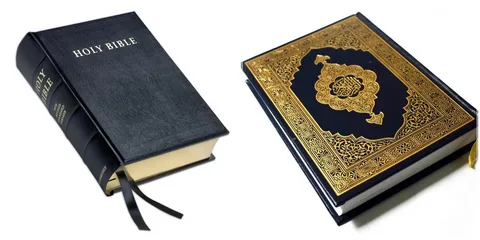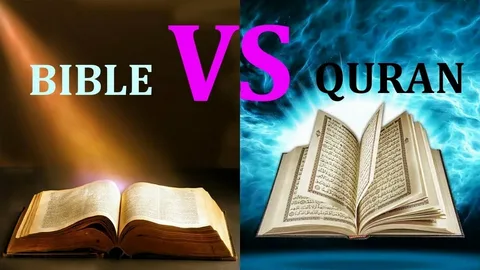differences between Bible and Quran, The sacred texts of Islam and Christianity, the Quran, and the Bible, respectively, have been guiding lights for millions of believers worldwide. As we delve into a comparative exploration, it’s crucial to recognize the historical, theological, and cultural nuances that shape these revered scriptures.
Historical Context and Revelation of the Quran and Bible

The first significant difference between Quran and Bible lies in their origins and development. Their timelines, authorship, and method of revelation are fundamentally distinct.
Origins and Development
Both the Quran and the Bible have rich histories. The Quran, believed by Muslims to be the literal word of God revealed to Prophet Muhammad, emerged in 7th-century Arabia. In contrast, the Bible, comprising the Old and New Testaments, has a more diverse origin, with texts written over centuries by various authors.
The Quran’s Revelation
The Quran, according to Islamic belief, is the literal and final word of God (Allah) revealed directly to the Prophet Muhammad through the angel Gabriel (Jibril). This process of revelation occurred over a period of approximately 23 years in 7th-century Arabia, from 610 to 632 AD. Muslims believe the Quran is a single, cohesive revelation from one divine source, preserved verbatim in its original Arabic. Its compilation into a single written volume (mus’haf) was completed shortly after the Prophet’s death to ensure its precise preservation.
The Bible’s Compilation
In contrast, the Bible is a collection of texts written by numerous authors—including prophets, scribes, apostles, and historians—over a span of roughly 1,500 years. It is divided into two main sections:
- The Old Testament: Largely corresponding to the Hebrew Bible (Tanakh), it contains texts written before the time of Jesus Christ, chronicling the history, laws, and prophecies of ancient Israel.
- The New Testament: Written by early Christians in the first century AD, it documents the life, teachings, death, and resurrection of Jesus Christ, as well as the formation of the early Christian church.
This extensive timeline and diverse authorship make the Bible more of a library of books than a single, monolithic text.
Key Figures and Events
The Quran is deeply tied to the life of Prophet Muhammad and the early Muslim community. The Bible, on the other hand, features figures like Moses, Jesus, and various prophets, with events ranging from the creation of the world to Jesus’s crucifixion and resurrection.
Differences Between Bible and Quran
The structural organization of the two scriptures further illustrates the bible vs quran distinction. Their arrangement, language, and literary styles reflect their unique revelatory histories.
The Quran: A Singular, Unified Text
The Quran is composed of 114 chapters, known as Surahs, which are further divided into verses, or Ayat. A defining feature is that the Surahs are not arranged chronologically according to when they were revealed. Instead, they are organized generally by length, from longest to shortest, with the exception of the opening chapter, Al-Fatiha. The entire text is in classical Arabic, a language Muslims consider integral to the Quran’s meaning and beauty, believing that any translation is merely an interpretation of its message.
The Bible: A Library of Books
The Bible’s structure is categorical. The Protestant Bible, for example, contains 66 distinct books. These books are organized by literary genre rather than chronology:
- Old Testament: The Pentateuch (Law), Historical Books, Wisdom Literature (Poetry), and Prophetic Books.
- New Testament: The Gospels (narratives of Jesus’s life), Acts (history of the early church), Epistles (letters to churches and individuals), and Revelation (apocalyptic prophecy).
This diverse collection includes various literary forms, from historical narrative and legal codes to poetry, proverbs, and personal letters.
Core Theological Differences: Quran vs Bible
The most profound distinctions in the quran vs bible debate are theological. These differences shape the core beliefs of Muslims and Christians and directly address the question: is the Quran the same as the Bible?
The Nature of God: Tawhid vs. The Trinity
The primary difference between Quran and Bible concerns the nature of God.
- Islam: The foundational principle is Tawhid, the absolute oneness and indivisibility of God. The Quran states emphatically that God is One, has no partners, and did not beget nor was He begotten (Quran 112:1-4).
- Christianity: The central doctrine is the Trinity, which holds that God is one being who exists eternally as three distinct persons: the Father, the Son (Jesus Christ), and the Holy Spirit. This concept is foundational to Christian theology but is explicitly rejected in the Quran.
The Role and Nature of Jesus
While Jesus (known as Isa in the Quran) is a highly revered figure in both religions, his nature and role are understood very differently.
- In Islam: Jesus is considered one of God’s mightiest prophets, born of the Virgin Mary, who performed miracles by God’s permission. However, he is seen as a human messenger, not as divine or the Son of God. The Quran also states that he was not crucified but was raised to heaven by God.
- In Christianity: Jesus is the central figure, believed to be the Son of God and the second person of the Trinity. His crucifixion and resurrection are the cornerstone of Christian faith, seen as the ultimate sacrifice for the salvation of humanity from sin.
The Concept of Scripture and Divine Word
How each faith views its holy book is also a key differentiator.
- The Quran: Muslims believe the Quran is the direct, unadulterated word of God, dictated to Prophet Muhammad. The Arabic text is considered sacred and inimitable. Translations are viewed as interpretations and do not hold the same divine status as the original Arabic.
- The Bible: Christians believe the Bible is the divinely inspired word of God, but it was written through human authors who used their own styles and personalities. Therefore, while it conveys God’s truth, it is not a direct dictation in the same sense as the Quran. Translations are widely accepted and used for worship and study.
Language and Translation Challenges
Linguistic Characteristics, The Quran’s unique linguistic features in Arabic pose challenges in translation, impacting nuances and interpretations. Translation Challenges, Translating ancient texts like the Bible requires careful consideration of cultural and linguistic differences.
Despite the significant theological divides, the Quran and the Bible share a common Abrahamic heritage. Both texts feature many of the same prophets and figures, including:
- Abraham (Ibrahim): Revered as a patriarch of faith in both traditions.
- Moses (Musa): A major prophet who received revelation from God (the Torah).
- Mary (Maryam): Highly venerated in both faiths, with an entire chapter of the Quran named after her.
- Adam, Noah, David, and Solomon are other prominent figures appearing in both scriptures.
Both texts also espouse similar moral principles, such as the importance of justice, compassion for the poor, honesty, and the worship of one God.
quran and bible comparison

The Quran and the Bible are two significant religious texts that are central to Islam and Christianity, respectively. While there are similarities between the two, there are also fundamental differences in terms of beliefs, content, and structure. Here’s a brief comparison:
- Religious Context:
- The Quran is the holy book of Islam, believed by Muslims to be the literal word of God as revealed to the Prophet Muhammad over a period of 23 years through the Angel Gabriel.
- The Bible is the sacred scripture of Christianity, consisting of the Old Testament (shared with Judaism) and the New Testament. The New Testament includes the life and teachings of Jesus Christ.
- Structure and Organization:
- The Quran is divided into chapters (surahs), which are further divided into verses (ayat). It is organized roughly by length, with the longest chapters generally at the beginning.
- The Bible is divided into two main sections: the Old Testament, which contains texts shared with Judaism, and the New Testament, which focuses on the life and teachings of Jesus Christ. Each section is further divided into books, chapters, and verses.
- Language:
- The Quran is primarily written in classical Arabic. Many Muslims believe that the Quran can only be fully understood in its original language, and translations are considered interpretations rather than the literal word of God.
- The Bible has been translated into numerous languages, making it one of the most translated texts in the world. Different Christian denominations may use different versions of the Bible, but translations are generally accepted.
- Divine Nature:
- Muslims believe that the Quran is the literal and unchanged word of God (Allah). It is considered the final and complete revelation.
- Christians believe that the Bible is inspired by God, but interpretations may vary. The Old Testament contains various forms of literature, including history, poetry, and prophecy, while the New Testament focuses on the life and teachings of Jesus and the early Christian community.
- Central Figures:
- The Quran emphasizes the oneness of God (Allah) and the role of Muhammad as the final prophet.
- The Bible, particularly the New Testament, revolves around Jesus Christ as the central figure, believed by Christians to be the Son of God and the savior of humanity.
It’s important to note that while there are shared themes and values between the two texts, the theological and doctrinal differences between Islam and Christianity are significant. Interpreting these texts can vary widely among different denominations and scholarly traditions within each religion.
Islamic Perspective on “People of the Book”
Islam provides specific guidance on interactions with Christians and Jews, whom the Quran refers to as “People of the Book” (Ahl al-Kitab). This designation acknowledges a shared monotheistic lineage. The Quran advocates for respect and peaceful coexistence.
“There shall be no compulsion in [acceptance of] the religion. The right course has become clear from the wrong.” (Quran 2:256)
Islamic teachings emphasize finding common ground, engaging in respectful dialogue, and ensuring justice for all, regardless of faith. The Quran encourages Muslims to invite People of the Book to “a common term between us and you: that we shall worship none but God” (Quran 3:64). This framework promotes interfaith understanding rather than hostility.
FAQs
Are the Quran and Bible similar in their core teachings?
While there are shared moral principles, differences in theological doctrines exist.
How do translations impact the interpretation of these texts?
Translations can influence understanding, and nuances may be lost or altered.
Do controversies arise from the interpretation of certain verses?
Yes, controversies can stem from varied interpretations of specific verses.
Are there ongoing efforts for dialogue between Muslims and Christians?
Yes, interfaith initiatives aim to promote understanding and harmony.
How do modern interpretations adapt to the changing societal landscape?
Scholars engage in nuanced interpretations, adapting to contemporary contexts.
Conclusion: A Summary of the Quran and Bible Comparison
In summary, this quran and bible comparison reveals two texts that are distinct in origin, structure, and, most importantly, theology. The debate of bible vs quran highlights fundamental differences in the conception of God, the nature of Jesus, and the very definition of scripture. While the Bible is a library of divinely inspired books written over centuries, the Quran is considered a single, direct revelation from God. Yet, they are not entirely alien to one another. They spring from a shared Abrahamic root, honoring many of the same prophets and teaching a common ethical core. Understanding these differences and similarities is essential for informed and respectful interfaith dialogue in our interconnected world.


